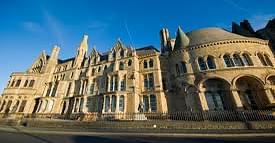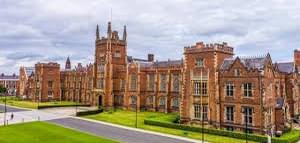Master of Science [M.Sc] (Forensic Psychology)
Field of Study:
£26,400/Yr
Tuition Fees
| Year | 1st Year Fees |
|---|---|
| Tuition Fees | £26400 (GBP 26400) |
The MSc in Forensic Psychology offers comprehensive professional training in forensic psychology. You will gain an in-depth experience of offending and victim pathways, as well as the investigative process. Through the use of a structured framework, you will also study theory and conduct research relating to forensic psychology practice. The course has two different routes:
Forensic Psychology, MSc (Accredited):
This route is fully accredited by the British Psychological Society (BPS), thereby accounting for Stage 1 of the Qualification in Forensic Psychology. Students enrolling on this route must have a first degree in psychology providing Graduate Basis for Chartership (GBC) with the BPS. We will attempt to provide you with a placement within local forensic units (ie HM Prison Service, NHS, Police, or the Forensic Interview Laboratory within the School of Psychology), however, this is not always guaranteed for all students.
Forensic Psychology, MSc (Non-accredited):
This route is not accredited by the BPS and therefore does not fulfil Stage 1 of the BPS qualification in Forensic Psychology. If a student on this non-accredited route wanted to progress onto Stage 2 of the Qualification in Forensic Psychology in the future, they would need to go back and complete the necessary conversion programme to give them the requisite GBC with the BPS.
This route is aimed primarily at those students who do not possess a first degree in psychology providing GBC with the BPS, but whose degree covers research methods and statistics relevant to psychology (eg a joint or combined honours degree which includes psychology, or an international psychology degree that does not confer GBC with the BPS). Other qualifications/experience may be acceptable and will be considered by the Programme Director (eg mental health specialists, police officers, prison officers).
No placements will be provided on this route (with the exception of the Forensic Interview Laboratory within the School of Psychology - space permitting). You are, however, free to gain access to your own placement.
Northumbria Police are proud to support the Forensic Psychology MSc and to be working in collaboration with the School of Psychology at Newcastle University.
You will develop your understanding of forensic psychology in a multi-disciplinary and professional context. We promote collaborative teaching and research through our strong links with UK forensic psychology practitioners, including Her Majesty's Prison Service, the National Health Service (NHS) and Police.
You will gain demonstrable, advanced knowledge and critical understanding in:
¥theories and professional issues of forensic psychology
¥the breadth and depth of forensic psychology
¥the role of psychology within the legal system (civil and criminal)
¥the National Offender Management system
¥legislation under which forensic psychologists work
¥investigative psychology and forensic interviewing
¥investigative process from pre-trial/conviction to through/after-care and restorative justice
¥legal, ethical and contextual issues in the evaluation of research and practice
¥debating and using evidence from appropriate literature
¥legal processes
You will also gain professional skills in:
¥writing parole board and analytical reports
¥developing forensic case formulations
¥independent learning
¥project planning
¥problem solving
¥time management
¥teamwork
¥reflection
Your specialist skills and knowledge will be developed through a combination of:
¥written reports
¥reflective journals
¥interview guides
¥oral presentations
Our staff are experts in the field of forensic psychology and offer a range of research specialisms, such as:
Dr Gavin Oxburgh, Forensic Psychologist (Degree Programme Director):
¥ investigative Interviewing and the use of empathy during suspect interviews
¥ the social and cognitive processes associated with achieving co-operation and the elicitation of memories from eye-witnesses and suspects of crime
¥ miscarriages of justice
¥ the interviewing of high-interest groups (HIGs), such as sex offenders and murderers
Faye Horsley, Forensic Psychologist (Deputy Programme Director):
¥ formulation of offenders
¥ assessment and Treatment of offenders
¥ working with personality disordered offenders
¥ adult fire setting and arson
Professor Gwyneth Doherty-Sneddon, (Head of School):
¥ the visuospatial processing links between visual social cues and visual non-social information (as in mental imaging)
¥ how children adapt to different communication media (eg face-to-face versus live video links)
¥ children's patterns of gaze as indicators of internal cognitive states like thinking and concentration
¥ gaze aversion as cognitive load management in people with neurodevelopmental disorders, including autism and Williams syndrome
Other notable members of staff include Professor Dame Vicki Bruce, Emeritus Professor Don Grubin, Dr Amy Fielden and Dr Trevor James.
We also welcome guest lecturers from:
¥ members of The Judiciary
¥ HM Prison Service
¥ the NHS
¥ Northumbria Police
¥ the Norwegian Police University College
¥ staff from the Newcastle Law School
Delivery:
This course is taught and based on the Newcastle campus and delivered by the School of Psychology. Teaching is delivered on Tuesdays and Thursdays from 9am to 5pm.
Eligibility & Entry Requirement
Academic Eligibility:
- Students should have a high school degreAAB including Mathematics and one of Physics, Chemistry or Biology, and excluding General Studies and Critical Thinking.
- For Biology, Chemistry and Physics A Levels, we require a pass in the practical element.
- GCSE Physics or Dual Award Science (minimum grade B or 6) required if Physics not offered at a higher level.
- International Baccalaureate 34 points with Mathematics at Higher Level grade 6. Physics required at Standard Level grade 5 if not offered at Higher Level.
Indian Eligibility:
- Typically Newcastle recognizes an 80% average in Standard XII as comparable to AAB at A-Level.
- This can be awarded by:
- Central Board of Secondary Education (CBSE)
- Council for the Indian School Certificate (CISCE)
- National Institute of Open Schooling (NIOS)
- Various state boards
- Autonomous schools
- The actual grades required will vary depending on the exam board.
Along with the minimum eligibility requirements, tests required to study in the UK, international students hailing from non-English speaking countries need to prove English proficiency through IELTS/TOEFL/any equivalent test.
TOP Scholarships
| Scholarship name | Award amount | Eligibility |
|---|---|---|
| - | - | - |
| - | - | - |
| - | - | - |
Key Resources for Your Study Abroad Journey
Course Guides
Masters (MS) in UK: Top Universities, Fees, Requirements & Deadlines
Masters in Clinical Psychology in UK: Top Colleges, Fees, Admissions, Scholarships, and Placements
Masters in Psychology in UK: Fees 2023, Top Colleges, Admissions, Placements & Salaries
Study MA in UK: Top Universities, Admissions, Fees, Scholarships, Jobs
Scholarship Grants & Financial Aids
| Name | Scholarship Per Student | Level of Study | Type | |
|---|---|---|---|---|
| GREAT Scholarship | Scholarship per student£ 12,499/Yr$12,499 | Level Of StudyMaster | TypeCollege-Specific | |
| Chevening Scholarship | Scholarship per studentVariable Amount | Level Of StudyMaster | TypeMerit-Based | |
| Commonwealth Scholarship | Scholarship per studentVariable Amount | Level Of StudyDoctorate | TypeMerit-Based | |
| India Postgraduate Taught Master’s Scholarship | Scholarship per student£ 3,555/Yr$3,555 | Level Of StudyMaster | TypeCollege-Specific | |
| UWL International Ambassador Scholarship | Scholarship per student£ 6,447/Yr$6,447 | Level Of StudyBachelor | TypeCollege-Specific | |
| QS scholarships | Scholarship per studentVariable Amount | Level Of StudyBachelor | TypeMerit-Based |
Similar Colleges


Robert Gordon University


University of Aberdeen


Aberystwyth University


University of Bath


Cranfield University


Queen's University Belfast


Ulster University


University of Reading



























Comments